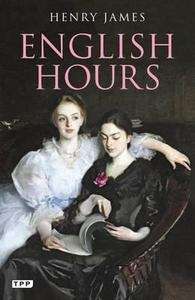English hours
A Portrait of a Country and its People

Editorial Tauris Parke
Fecha de edición marzo 2011
Idioma inglés
EAN 9781848854857
224 páginas
Libro
Resumen del libro
'Spring was already in the air, in the town; there was no rain but there was still less sun - one wondered what had become of it, on this side of the world - and the grey mildness, shading away into black at any pretext, appeared in itself a promise.' Henry James left America for England in 1876 and remained in his adopted country for the next three decades. Arriving in Liverpool, he made his way first to London, the 'dreadful, delightful city', which he would come to both love and hate. James revelled in the exoticism and immensity of all that was unknown to him and his writing spills over with youthful excitement, humour and vivid descriptions of the people, landscapes, towns and cities he encountered. In London, he marvelled at the architecture of Christopher Wren and the glamour of the Strand and observed with equal pleasure the seedier parts of the city, where gin shops glowed on the corners of dark alleys.
He later set out to explore the English countryside: Chester, Warwick, Devon, Wells, Salisbury, Suffolk and Rye, where he eventually settled, bought Lamb House and wrote prolifically - producing some of his finest works, including What Maisie Knew, The Wings of the Dove, The Golden Bowl and The Middle Years. First published in 1905, English Hours is one of Henry James' most loved works of travel and a now-classic portrait of England by one of the great masters of 19th century literature.
Biografía del autor
x{0026}lt;p Henry James (Nueva York, 1843 - Londres, 1916) x{0026}lt;/p x{0026}lt;p Nació en una familia acomodada norteamericana, relacionada con artistas y escritores, y ya de muy joven viajó por Europa. Empezó a estudiar Derecho, pero prefirió orientar su carrera hacia la literatura y colaboró asiduamente en la prensa. Es uno de los escritores más importantes y reconocidos de la literatura estadounidense y un gran exponente de la narrativa transatlántica. Trazó relaciones con los grandes escritores de su época, como Edith Wharton, Robert Louis Stevenson, Gustave Flaubert, Iván Turguénev... Supo describir la complejidad de la alta sociedad neoyorquina en su época dorada, con mucha profundidad y un fuerte análisis psicológico de sus protagonistas.x{0026}lt;/p x{0026}lt;p x{0026}lt;br x{0026}lt;/p








